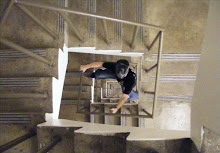National Hurricane Center
http://www.nhc.noaa.gov/
#1. Hurricane Andrew, Southeast Florida and Southeast Louisiana, 1992. $26,500,000,000
#2. Check for Hazards in the Home, Identify Safe Places Indoors and Outdoors, Educate Yourself and Family Members, Have Disaster Supplies on Hand, Develop an Emergency Communication Plan, Help Your Community Get Ready. http://earthquake.usgs.gov/prepare/
#3. 6 non-fatal crashes around Boulder, Co. 0 fatal crashes.
Alaska Airlines.
49
Wednesday, January 27, 2010
Monday, January 25, 2010
Rathergate
Rathergate: an infamous day in the history of news reporting and journalism, when the one of the media's most trusted faces was brought to his knees by the honest bloggers who saw falsehood in his reporting. However, there is more to it than that.
CBS was sent several documents making claims that would damage George Bush's reputation as a military man mere weeks before the 2004 election, a critical time for politicians and voters alike. However, in the hours following the 60 Minutes report with Dan Rather, bloggers began to rip the documents apart as forgeries, and before a week had passed, CBS was forced to acknowledge their mistake, and as a consequence let Dan Rather and several other staff members go.
This incident is revered as a revolutionary day for journalists and bloggers alike. It showed that there is a more involved checks and balances system for the media, and an effective one at that. Bloggers have the availability and access of the internet at their disposal, being able to say what they want, and in turn to point out the mistakes of their more professional counterparts. Intelligent men and women who are unable, or unwilling, to involve themselves in the media can effect change in the establishment, which is a great and new thing. It also forces journalists to be more honest, lest they be found out by the people and hung up as an example. As an aspiring journalist, you'd think this would worry me, but it doesn't. My intent, and goal, is to report the truth. I don't think I have anything to worry about, as long as I remain honest. There will always be those who disagree with me and argue no matter what facts I present, but there wont be any controversy in the conveying of my news.
I think one of the worst parts of Rathergate was the political nature of the incident. Not in the political nature of the government, but the politics of journalism and business of news. And make no mistake, the News is a business now. CBS failed to authenticate the documents before putting them in Rather's hands, and the public repudiation was directed at the entire organization, not just Dan Rather. However, Dan Rather at the time was the face of CBS, and the CEO's of CBS had just gained a large scar in the form of the Killian documents. But rather than just patching up the mistake and moving on, they decided they needed a new face entirely. The blemish on one of their most popular news anchor's reputations was just too much to handle, so they got rid of it. Maybe a smart business move, since keeping Rather might have hurt their ratings, but it wasn't the right thing to do. Rather was a trusted news anchor for a reason. He reported the news, and people believed him. It wasn't even his fault the incident occurred, but he was the one who was punished. He even said, after the incident, "if I knew then what I know now – I would not have gone ahead with the story as it was aired, and I certainly would not have used the documents in question."
This demonstrates a trend that has long bothered me. News programs, particularly TV news, but others as well, are run by people more motivated by profits and agendas than they are by reporting accurate news to the people. They care more for their public image than they do for competent reporters who make mistakes, and rely on that image more than the public's reliance on accurate news. The drama and impact of the documents, two weeks before the election, must have seemed like gifts from the gods to the higher-ups of CBS, something new and edgy that would attract more viewers. They probably didn't care if they were authentic or not as long as it brought in more ratings, although they might have thought twice if they knew the trouble they would cause for them.
Mind you, this is speculation on my part.
But you can see this trend all over. When Anna Nicole Smith died, Fox news covered the story every day for more than a month. I know. I saw it whenever my mom stopped to watch the channel. It was embarrassing. And you can see plenty of shows and channels out there that just bring in opposing experts to duke it out in a pointless debate which has no purpose beyond entertainment, seeing as how no one on opposing sides is going to be convinced of anything contrary to what they already believe.
Why? Not only because it's cheap, but because people want to watch. And that, above all else, even above reporting and educating, is what producers of media want.
http://www.youtube.com/watch?v=vmj6JADOZ-8
CBS was sent several documents making claims that would damage George Bush's reputation as a military man mere weeks before the 2004 election, a critical time for politicians and voters alike. However, in the hours following the 60 Minutes report with Dan Rather, bloggers began to rip the documents apart as forgeries, and before a week had passed, CBS was forced to acknowledge their mistake, and as a consequence let Dan Rather and several other staff members go.
This incident is revered as a revolutionary day for journalists and bloggers alike. It showed that there is a more involved checks and balances system for the media, and an effective one at that. Bloggers have the availability and access of the internet at their disposal, being able to say what they want, and in turn to point out the mistakes of their more professional counterparts. Intelligent men and women who are unable, or unwilling, to involve themselves in the media can effect change in the establishment, which is a great and new thing. It also forces journalists to be more honest, lest they be found out by the people and hung up as an example. As an aspiring journalist, you'd think this would worry me, but it doesn't. My intent, and goal, is to report the truth. I don't think I have anything to worry about, as long as I remain honest. There will always be those who disagree with me and argue no matter what facts I present, but there wont be any controversy in the conveying of my news.
I think one of the worst parts of Rathergate was the political nature of the incident. Not in the political nature of the government, but the politics of journalism and business of news. And make no mistake, the News is a business now. CBS failed to authenticate the documents before putting them in Rather's hands, and the public repudiation was directed at the entire organization, not just Dan Rather. However, Dan Rather at the time was the face of CBS, and the CEO's of CBS had just gained a large scar in the form of the Killian documents. But rather than just patching up the mistake and moving on, they decided they needed a new face entirely. The blemish on one of their most popular news anchor's reputations was just too much to handle, so they got rid of it. Maybe a smart business move, since keeping Rather might have hurt their ratings, but it wasn't the right thing to do. Rather was a trusted news anchor for a reason. He reported the news, and people believed him. It wasn't even his fault the incident occurred, but he was the one who was punished. He even said, after the incident, "if I knew then what I know now – I would not have gone ahead with the story as it was aired, and I certainly would not have used the documents in question."
This demonstrates a trend that has long bothered me. News programs, particularly TV news, but others as well, are run by people more motivated by profits and agendas than they are by reporting accurate news to the people. They care more for their public image than they do for competent reporters who make mistakes, and rely on that image more than the public's reliance on accurate news. The drama and impact of the documents, two weeks before the election, must have seemed like gifts from the gods to the higher-ups of CBS, something new and edgy that would attract more viewers. They probably didn't care if they were authentic or not as long as it brought in more ratings, although they might have thought twice if they knew the trouble they would cause for them.
Mind you, this is speculation on my part.
But you can see this trend all over. When Anna Nicole Smith died, Fox news covered the story every day for more than a month. I know. I saw it whenever my mom stopped to watch the channel. It was embarrassing. And you can see plenty of shows and channels out there that just bring in opposing experts to duke it out in a pointless debate which has no purpose beyond entertainment, seeing as how no one on opposing sides is going to be convinced of anything contrary to what they already believe.
Why? Not only because it's cheap, but because people want to watch. And that, above all else, even above reporting and educating, is what producers of media want.
http://www.youtube.com/watch?v=vmj6JADOZ-8
Thursday, January 21, 2010
Rawr
I clicked through the list of blogs, looking for an interesting one to review. I laughed at the lolcats, salivated while reading the food blogs, and cocked my head to side at seeing how much better some people's homes are than mine. But none really appealed to me.
The last link I clicked on was the blog titled "TreeHugger." Here I was thinking to myself, man, another blog decrying global warming and the republicans, or maybe even a conservative trying to show that he has a heart. BORING. There are so many environmental opinion blogs out there that it's hard to distinguish them.
I can distinguish TreeHugger.
I can do so because this blog isn't just another opinion blog, where the author cites a bunch of articles and databases that I probably won't feel like verifying because it's only a blog and not worth my time. No, this blog has prompts for articles that report on new findings or studies that could be of some concern to the reader.
To me, the articles read like the articles of a respected magazine, such as National Geographic, and that greatly appeals to me. It implies the blog's intended audience is not the overly opinionated types who enjoy debates and arguments, but rather the intelligent layman who might watch Planet Earth. The content isn't dumbed down to better keep your interest or attract more readers, but rather the content itself is relied upon to attract the readers to the site, as the content interests them. The content stands on its own. At the same time, the articles are short and sweet, enough to give you information about the key players and important facts, enough to make you want to research more on your own. Thought provoking and makes you want to know more: isn't that what the rst of our media supposed to do?
One of the only complaints I have about the blog is the design. There are too many advertisements surrounding the articles, and the link system it has makes the blog seem cluttered. It makes it so that upon finding the blog, I don't really know where to click immediately to get more info, and almost doesn't seem worth the time to the hurried attention span of the internet surfer.
I think this blog does a wonderful job with its information and content. No wonder it has so many readers.
Or maybe I like the blog because its first article is about tigers :3
RAWR
The last link I clicked on was the blog titled "TreeHugger." Here I was thinking to myself, man, another blog decrying global warming and the republicans, or maybe even a conservative trying to show that he has a heart. BORING. There are so many environmental opinion blogs out there that it's hard to distinguish them.
I can distinguish TreeHugger.
I can do so because this blog isn't just another opinion blog, where the author cites a bunch of articles and databases that I probably won't feel like verifying because it's only a blog and not worth my time. No, this blog has prompts for articles that report on new findings or studies that could be of some concern to the reader.
To me, the articles read like the articles of a respected magazine, such as National Geographic, and that greatly appeals to me. It implies the blog's intended audience is not the overly opinionated types who enjoy debates and arguments, but rather the intelligent layman who might watch Planet Earth. The content isn't dumbed down to better keep your interest or attract more readers, but rather the content itself is relied upon to attract the readers to the site, as the content interests them. The content stands on its own. At the same time, the articles are short and sweet, enough to give you information about the key players and important facts, enough to make you want to research more on your own. Thought provoking and makes you want to know more: isn't that what the rst of our media supposed to do?
One of the only complaints I have about the blog is the design. There are too many advertisements surrounding the articles, and the link system it has makes the blog seem cluttered. It makes it so that upon finding the blog, I don't really know where to click immediately to get more info, and almost doesn't seem worth the time to the hurried attention span of the internet surfer.
I think this blog does a wonderful job with its information and content. No wonder it has so many readers.
Or maybe I like the blog because its first article is about tigers :3
RAWR
Wednesday, January 13, 2010
Walter Lippmann Response
The news of the day as it reaches the newspaper office is an incredible medley of fact, propaganda, rumor, suspicion, clues, hopes, and fears, and the task of selecting and ordering that news is one of the truly sacred and priestly offices in a democracy.
-Walter LippmannI believe this to be an optimistic view of journalism. It sets up the media as this holy institution, beyond corruption or influence, standing untouched in the brutal world of politics and censorship. But the media is not beyond the reach of these things. Yes, the media does sort through fact and propaganda and rumor, but rather than just reporting facts as they are, it places the propaganda and rumor right alongside the facts, sometimes because of who backs the newspapers, sometimes just to sell. The paparazzi takes the wildest rumors available that have evidence enough to convince the lowest common denominator and puts them right on the covers of their magazines. Even newspapers and news programs become culprits when they allow political agendas to frames the stories reported, or when they permit a political force to assign them propaganda to spout to the people.
However, though his view was somewhat optimistic, Walt Lippmann tries to get to the heart of what journalism should be, despite what it might be today. At it's core, the press and media is meant to be a tool of the people. It allows the people to find facts that they otherwise wouldn't learn, and the people can usually sift through the fiction of propaganda and rumor and derive the truth from the facts given. Usually.
The media is meant to provide the people with a verbal check to the government, allowing them to expose dishonest politicians and the plethora of scandals the may hinder the democracy we've created. The press is the people's voice.
In that way, Lippmann had it right. The press is an essential tool to the running of a successful democracy. The press is the very symbol of freedom. As long as the press exists, the facts can be spread to any number of people, allowing them to make educated and informed choices when it comes to their government. But like the allegorical church Lippmann refers to, the press is corrupted from what it should be. People abuse the freedom that it represents, using it to spread gossip and invade the privacy of people's lives.
That is not to say that there is no good press. There are many journalists who work hard to bring not only objective truth to the people, but objective truth with context. This last part is important. Without the context for the facts, some people might not know what conclusions they should draw from the truths given to them, and wouldn't know to make the decision best for themselves. They should be told what choice to make, but they need to be shown the overall context for their decisions. It is here that some media take advantage, distorting the context in order to influence decisions, but many journalists just do enough to allow a person to make the best decision for himself.
"...and were it left to me to decide whether we should have a government without newspapers or newspapers without a government, I should not hesitate a moment to prefer the latter." -Thomas Jefferson
Tuesday, January 12, 2010
Subscribe to:
Posts (Atom)







